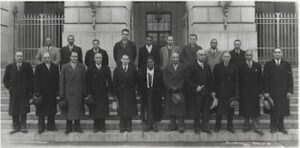
The 'Black Cabinet' (1938)
*On this date in 1933, the 'Black Cabinet' is celebrated. This was an unofficial group of Black advisors to President Franklin D. Roosevelt.
Beginning in 1933, Secretary of the Interior (and former Chicago NAACP president) Harold Ickes led an effort to open high-level civil servant positions to Black professionals. The first group of these professionals, 27 men and three women who were formerly architects, demographers, economists, engineers, lawyers, sociologists, and social workers, formed the core of this Black Cabinet. African American federal employees in the executive branch formed an unofficial Federal Council on Negro Affairs to influence federal policy on race issues.
With Eleanor Roosevelt's support, the Black Cabinet ensured that Blacks received 10 percent of welfare funds. The Cabinet debated that Black citizens were underrepresented among recipients of aid under the New Deal, in large part because Southern Democrats had influenced the structure and implementation of programs to aid their white constituents. Programs such as the Works Projects Administration (WPA) and the National Youth Administration attempted to direct 10 percent of funds to African Americans (as their proportion of the U.S. population).
These agencies set up separate all-Black units with the same pay and conditions as those in white units, which Black voters favored. Most members were not politicians but community leaders, scholars, and activists. Mary McLeod Bethune served as an informal organizer of the Cabinet; Rayford Logan drafted Roosevelt's executive order prohibiting the exclusion of Blacks from the military in World War II. Other leaders included William H. Hastie and Robert C. Weaver. The leaders associated with the Black Cabinet laid part of the foundation of the 20th-century American Civil Rights Movement that strengthened in the postwar years.
The Cabinet tried to create jobs and other opportunities for unemployed Blacks; concentrated in rural areas of the South, African Americans made up about twenty percent of the poor in the Depression Era. They were often the first let go from industrial jobs. Most Blacks did not benefit from some of the New Deal Acts. The WPA created agencies that employed writers, artists, and photographers. Murals were painted, and they commissioned sculptures for numerous federal buildings constructed during this period. The Federal Writers' Project paid its workers $20 a week, and they wrote histories of every state in the Union, covering major cities in addition. Under Roscoe E. Lewis, the Virginia Writers' Project sent out an all-Black unit of writers to interview formerly enslaved African Americans. Such accounts were also solicited in interviews in other states.
The Slave Narrative Collection of the Federal Writers' Project is one of the WPA's most enduring and noteworthy achievements. Members of the Black Cabinet worked officially and unofficially to provide insight into the needs of African Americans. In the past, there had never been so many Blacks chosen at one time to work in the federal government together for the express benefit of African Americans. Another prominent member of Roosevelt's Black Cabinet was Eugene K. Jones, the Executive Secretary of the National Urban League. Although the Cabinet was concerned with civil rights, Franklin D. Roosevelt believed there were larger problems than racial inequality during wartime; he was also struggling to maintain the support of the Southern white Congressional Democrats.
The 45 primarily comprised an advisory group to the administration. Roosevelt declined to support legislation banning the use of the poll tax in the South and did not support legislation to make lynching a federal offense. In his twelve years as president, Roosevelt did not appoint or nominate a single African American as a secretary or undersecretary in his presidential Cabinet. However, by mid-1935, 45 African Americans were working in federal executive departments and New Deal agencies. Roosevelt gave no formal recognition to the group.